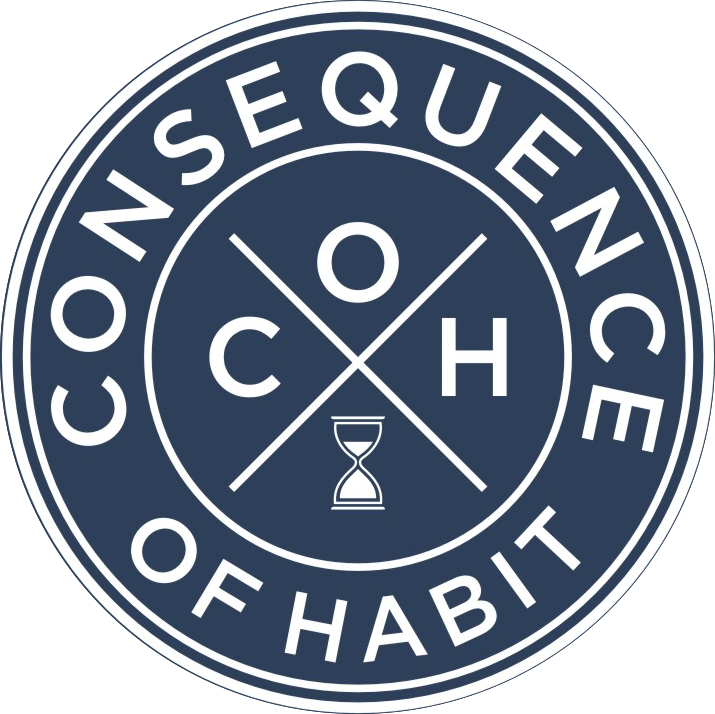Questions From a Listener
I recently received an email from a supporter of the podcast and someone I respect very much. In the email he first congratulated me on the shows one year anniversary, but then asked me what I’ve learned from my guests over the past twelve months. Below are the questions he asked and my response. I would love your thoughts on your own experience with habits, good or bad.
1) Thinking back on the interviews, are there any societal trends you are seeing?
Bad habits are almost always used to escape or distract you from a perceived or real sense of discomfort. This escape or distraction offers you a quick shot of dopamine or serotonin... hence making you feel good for a short period of time. With that said, modern society offers endless avenues of escape through access to phones, drugs, alcohol, sex/porn, video games, fast food, etc. That’s not to say that many (not all) of these things haven’t always been around, they’ve just never been as accessible as they are now.
2) Any insights from interviews with guests where the focus has been on good habits?
My biggest take away when discussing good habits has been how small they start. Trying to make big habit changes is rarely sustainable or effective, and even worse it conditions people to believe they aren’t capable of change. Consistency and small changes seem to be a common thread among guests who’ve adopted good habits.
3) What are the key insights from interviews where the focus has been on overcoming bad habits?
The biggest take away has been the emotions associated (conscious or subconscious) with the habit. Bad habits are connected to temporary pleasure or escape from discomfort. Which again doesn’t serve the person over any length of time. It only brings about more shame and guilt which then leads to wanting to feel better quickly…it’s a perpetual snowball. Knowing you have a bad habit and continuing to do it chips away at your own self-worth. So, to overcome the habit you need to address what you’re trying to escape from.
4) What personality traits have you seen in many of your guests?
Emotional awareness and the willingness to change; but the threshold for that is different in everyone. It’s what’s so interesting about the topic. I talk to some guests who are trying to change habits to become happier and more productive individuals, while other guests have self-medicated to numb pain and trauma for so long that changing their habits is literally a life-or-death issue. The motivation for change is different yet it falls under the same banner.
5) Who did you learn the most from? What was it?
It’s not a specific person but more a specific age group. I’m always impressed by young men and women who are questioning their own habits and behavior in their 20’s or early 30’s. Think of your mind like it’s a computers operating system.. these men and women are installing virus protection and automatic updates at a really important time in their lives. This has to lead to a much deeper understanding of who you are and is an amazing act of self love. Associating actions with feelings is a process I wish I had started earlier in life. It leaves a lot less debugging later on in life.
6) How has your interviewing style evolved from interview one until now?
I’m feeling more comfortable in letting people talk and finish their thoughts without trying to jump in to fill any gaps of silence. I’ve gotten away from my own story which is something I need to start incorporating more.
7) What are two or three lessons you have learned from guests that you have incorporated into your routine (or plan to)?
This is always changing but going back to the consistency and making small changes in a positive direction…whatever that looks like at that given moment. Currently I’m trying to be aware of when I’m feeling the need to distract myself, then trying to connect what I’m trying to escape from. I’m also incorporating breathwork into a daily habit.
8) What are the top 3 bad habits guests have struggled with?
I can group them all into one…they (we) all use (insert something that gives a quick hit of dopamine) to avoid pain and discomfort caused by (insert anxiety, depression, self-doubt, imposter syndrome, trauma, boredom). Stillness in our minds is the holy grail and we’ll go to great lengths to escape our minds when we don’t have it. Some of have more discomfort than others and will go to greater lengths to escape. I think you gain a lot more empathy for people (and ourselves) when you look at bad habits through that lens.
9) What are the top 3 good habits guests have adopted – to overcome previous bad habits?
The 3 biggest things that I’ve heard guests say aren’t actual habits, they’re identifying a habit they want to change, understanding why they’re doing it (most important), then consistently making micro changes and rewarding themselves for the change. That way you start to connect the change or new habit with reward
